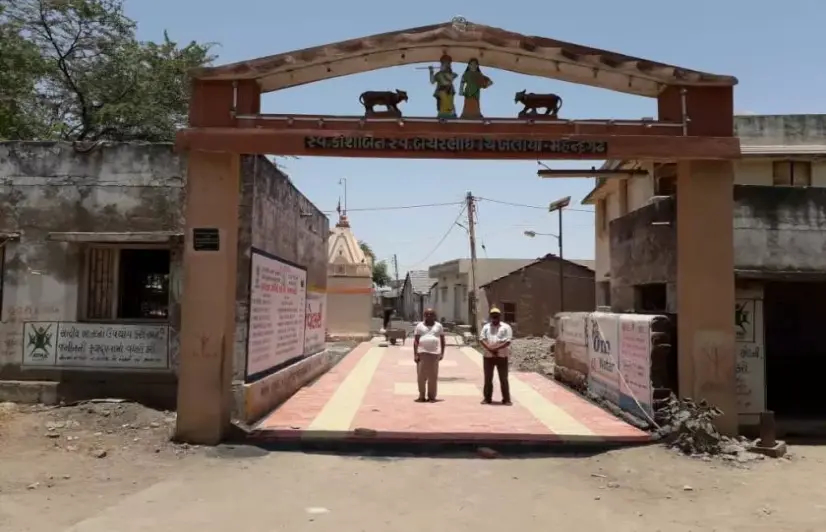Incentivising Gujarati villages to stay crime-free

Incentivising Gujarati villages to stay crime-free
A unique government scheme in Gujarat rewards panchayats that promote social harmony and keep their villages free of crime.
Ahmedabad: Being a good citizen and obeying the law of the land is not just a legal or moral obligation for thousands of villagers in Gujarat but it also comes with its own set of financial incentives. As part of a scheme named Tirthgam-Pavangam, the state government has gifted nearly Rs 23 crore to over 1,300 crime-free villages in 16 years.
Launched in 2004, the scheme aims to promote unity, social harmony and all-round development of villages. It helps in lowering the crime graph in rural areas as crime-free villages get rewarded. Till 2019, 1,319 village panchayats have been gifted Rs 22.9 crore under the scheme.
What's the scheme
According to a government notification on the Tirthgam-Pavangam scheme, if any village is free from crime for a consecutive period of three years, it falls under the ‘Pavangam’ category. Villages that hold crime-free status for five years consecutively fall under the ‘Tirthgam’ category. 'Tirthgam' consists of two words - Tirth means pilgrimage centre and Gam means village. The word Pavan means sacred.
The crime-free status is determined by checking police records of all villages in the state. Gram panchayats of Pavangam villages are given Rs 2 lakh, while Tirthgams are given an additional reward of Rs 1 lakh. The cycle then repeats, so it's not a one-time gift. Since 2004, 976 villages have become Tirthgam in the state, while 343 are Pavangam.
Out of the 33 districts of Gujarat, villages from 25 districts have benefitted from this scheme so far. It includes villages from Ahmedabad, Porbandar, Kachchh, Gandhinagar, Panchmahal, Surendranagar, Surat, Sabarkantha, Valsad, Bharuch, Bhavnagar, Patan, Surat, Banaskantha, Navsari, Vadodara, Jamnagar, Kheda, Amreli, Tapi-Vyara, Dang, Rajkot, Morbi, Mahesana and Junagadh districts.
Under the scheme, road accidents are not considered a crime as they are not intentional.
Free to pursue development
The stated mandate of the scheme is to promote communal harmony and Mahendragadh, which was awarded Tirthgam status in 2011, is a testament to its success. Situated in Morbi district, 80 per cent out of the village's 750 residents belong to the Patidar community. But the interesting fact is that the Panchayat leader, or ‘Sarpanch', is a Muslim woman - Mumtaz Mutakbhai Bhoria.
“The fact that I am the Sarpanch of a Patidar village itself explains how closely bonded the people are over here. I am actively involved in every developmental activity in the village and that’s what matters for all of us. The people are happy, I am happy and schemes like Tirthgam and Pavangam are a remarkable step from the government to promote peace and harmony in villages," Bhoria says.
She said due to the communal harmony, understanding and mindset of development, this village panchayat has also been Samras Panchayat for the sixth term. The status refers to Samras Gram Yojana where leaders and members of panchayats are chosen by consensus and not through elections. The state government provides additional incentives to Samras Panchayats.
Geratnagar, a beautiful village located on the outskirts of Ahmedabad in Daskroi taluka, has a similar tale. The village was registered as Tirthgam in 2020. Village sarpanch Shardaben Ranchhodbhai Makwana agrees that such schemes have been a motivational factor.
“We have a population of about 2,000 people from different castes. There has never been any crime in the village as we want peace and development. That’s why many young boys are doing various jobs in the city while others are busy with their agricultural activities. These schemes are wonderful if implemented properly,” says Makwana.
The carrot and carrot approach
Bipinbhai Girdharbhai Patel, a young sarpanch from Sabarkantha district's Prithvipura village, explains that due to the crime-free nature of the village, the focus has been on undertaking various developmental works. "This scheme just endorses humanity and motivates us. It is essential that all the villages gradually become crime-free and people are happy," says Patel.
The village was awarded Tirthgam status in 2018.
“This scheme is unique in its nature and it’s a reflection of how the state government is committed towards the welfare of the people. It has brought many positive stories from various villages. In future, more villages will be benefitted from the scheme," he said.
Police officials say there are many villages in the state that have always been crime-free. "But once it is recognised and rewarded, it brings a new change. When such schemes are introduced, it brings a positive movement in rural areas. If it brings peace among people, it's really worthwhile in today's time," D Jadeja, Deputy Superintendent of Police, Anand district, says.
Would you like to Support us
101 Stories Around The Web
Explore All NewsAbout the Reporter
Write For 101Reporters
Would you like to Support us
Follow Us On


